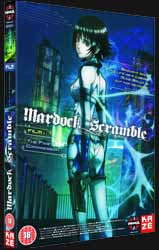|
Click here to return to the main site. DVD Review
In the futuristic Mardock City, 15-year-old Rune Balot is a prostitute in the employ of notorious gambler Shell Septinus. One night, Shell decides to abandon the young girl and, in an act of attempted murder, leaves her for dead in a burning car. However, the badly injured Balot is rescued from the inferno by a pioneering scientist, Dr. Easter, and is subconsciously given the choice between living and dying by way of an emergency life preservation ordinance known as Mardock Scramble 09. Choosing the former, she is saved from death by being transferred into a cyborg and, with the help of a cybernetically enhanced mouse called Oeufcoque and some seriously advanced technological hardware, is given the opportunity to undertake a covert investigation into the illegal activities of the man who tried to kill her... Adapted from the first part of the trilogy of novels by Tow Ubukata, Mardock Scramble: The First Compression presents a contemporary take on cyberpunk in anime, with its narrative of corrupt super-corporations, street-level technology, body modification and flashy violence familiar since the genre's late 1980s/1990s heyday. While the background and scenario echo various established series, Ghost in the Shell (GitS) naturally being chief among them, it has enough thought and imagination on display to overcome its looming influences. The heroine, Rune Balot, is a figure who perhaps consciously echoes many of her anime forebears: like GitS' Motoko Kusanagi she's a superhumanly capable cyborg whose abilities are nonetheless dependent on the advanced technology and resources bestowed on her, with strings attached by a higher power. Where Kusanagi at least had the dubious legitimation of a government agency behind her, though, Balot has only the dissolute scientist Easter and his ramshackle fringe project, and her position as corporate catspaw rather than agent of justice is all too precarious - indeed, without her cybernetic enhancements she can't even speak. Wisely, Ubukata doesn't neglect the public sphere the way cyberpunk stories, in love with their untouchably cool protagonists, sometimes do: Balot's status as a criminal witness and artificially resurrected person leave her vulnerable to attack from the legal domain, and among the most effective scenes in the film is her forced testimony where, as prostitute and incest survivor, she is - with depressing realism - obliged to prove her lack of complicity in her abuse. It's these scenes, and the well-scripted dialogues between Balot and her only real ally, the insecure, sympathetic AI Oeufcoque, that leave the best impression. While Balot may be sympathetically portrayed, the story's treatment of her abuse is undermined by the arguably excessive amount of nudity and sexual content - toned down in the theatrical version, fully present in the director's cut, both of which are included here. Like Rei Ayanami of Neon Genesis Evangelion, Balot is an emotionally disturbed product of unnatural super-science bordering on the realm of the religious, a victim of abuse and tool of a shadowy conspiracy: like Rei, she appears in rather more lingering nude shots than seem appropriate. The queasy tone of her presentation is mitigated somewhat by her wilful nature, that despite her meek demeanour shows itself in her dynamic relationship with Oeufcoque and her appropriation of her abilities for her own whims, from messing with traffic lights to deliberately going against orders in the film's action-heavy finale. Visually Mardock Scramble is impressive, making the most of its theatrical budget and showcasing a future world that, while occasionally falling foul of cyberpunk tech-noir clichés, is much more open and varied than I was expecting: the sunny scenes of Balot drifting through the city streets and shopping precincts are lovely, and the action scenes gripping and well directed. The voice cast excel too, notably star Megumi Hayashibara (famed voice behind Rei Ayanami and many other iconic characters) as Balot and cult performer Norio Wakamoto as a depraved henchman, and the music score by Conisch is as varied and sumptuous as the visuals. Despite its short length - just over an hour - The First Compression has the feel of a true anime movie, and it's to be hoped the upcoming second and third parts maintain its momentum. 8 Richard Hunt |
|---|

